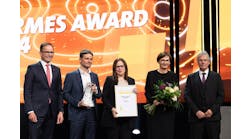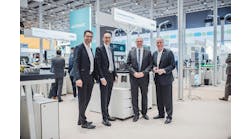PTC has acquired Frustum, an advanced generative design software company, for approximately $70 million. Frustum’s technology for generative design—an approach that leverages artificial intelligence (AI) to generate design options— will be added to the PTC Creo portfolio.
Based in Boulder, Colorado, Frustum offers patented desktop and cloud-based engineering software that enables designers and engineers to leverage AI capabilities that guide the discovery of high-performance, next-generation product designs.
“PTC is pushing the boundaries of innovation with this acquisition,” said Jim Heppelmann, president and CEO, PTC. “Creo is core to PTC’s overall strategy, and the embedded capabilities from ANSYS and, later, Frustum will elevate Creo to a leading position in the world of design and simulation. With breakthrough new technologies such as AR/VR, high-performance computing, IoT, AI, and additive manufacturing entering the picture, the CAD industry is going through a renaissance period, and PTC is committed to leading the way.”
Frustum complements PTC’s strategic relationship with ANSYS, which was announced at LiveWorx in June, and will bring analysis upstream to the start of the design process. With embedded Frustum and ANSYS capabilities, Creo will be able to recommend design approaches using generative design, guide the user through the iterative design process using ANSYS Discovery Live and validate the full product design at scale using the broader ANSYS Discovery suite.
“This acquisition is a natural step for PTC and its customers,” said Jeff Hojlo, program director, product innovation, IDC. “AI and machine learning (ML) are widely discussed as two of the most impactful technologies of the future. For design, engineering, and R&D, the potential positive impacts of complementing the development process with AI and ML are astounding: lowering cost of quality (which is currently 20-25 percent of annual revenue at the average manufacturer), improving product success rate (which remains very low with more than 80 percent of products failing), and improving time to market and time to revenue by meeting customer needs accurately the first time.”
According to PTC, generative design can increase engineering productivity, improve innovation and conceptual design exploration, develop higher-performance designs that are lighter weight, with improved durability, optimize new products for improved manufacturability, reduce material costs, and decrease manufacturing cycle times, create complex geometries optimized for additive manufacturing and deliver better products faster.
Frustum’s AI component is able to learn and performs key tasks, including providing feedback to a designer early in the design phase, optimizing designs for multiple objectives simultaneously and offering a designer with multiple novel design alternatives, modifying designs to manage multiple requirements and constraints, physics, materials availability, manufacturing processes, and design objectives and automating testing the outcomes of the design with other enterprise insights, including costing, supply chain, and quality data.
PTC will feature this announcement on-stage at PTC Forum Europe, held in Stuttgart, Germany, on Nov. 28.
The transaction closed on Monday, Nov.19. The acquisition is not expected to add material revenue for 2019 or to be dilutive to the financial guidance PTC provided on Oct. 24.



